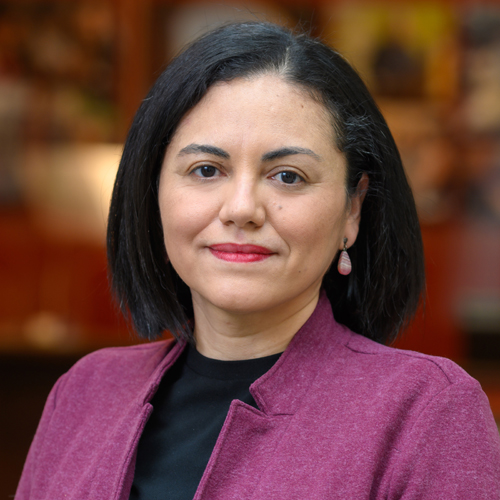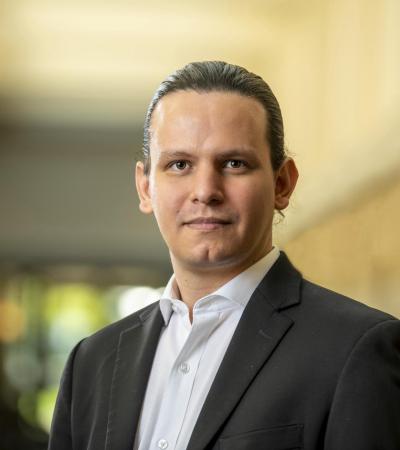PEOPLE E-VAW LAB
Director and Principal Investigator

Abby Córdova’s research program relies on a multidisciplinary approach to examine the causes and consequences of inequality and marginalization, integrating topics related to violence against women, organized crime, militarization, and international migration in the context of Latin America and the Caribbean. Along with several collaborative projects about gender-based violence in the region, Abby is working on a book manuscript that examines the role of the state in increasing the risk of gender-based violence in countries in the Global South marked by organized crime and the militarization of public security. Her current research has been supported by a Harry Frank Guggenheim Distinguished Scholar Award and grants from Evidence in Government and Politics (EGAP) as well as Kellogg's Ford Program in Human Development and Solidarity, Notre Dame Research, and Notre Dame International. Her published work has also been recognized with a Sophonisba Breckinridge Award from the Midwest Political Science Association (MPSA) and a Mirian Irish award from the Southern Political Science Association (SPSA) for best papers on the topic of gender and politics. Her work includes two book projects and recently published articles examining the attitudinal and behavioral effects of policy responses to violence against women:
- Córdova, Abby. Violence against Women in Multi-Violence Contexts: Militarization and Organized Criminal Groups’ Territorial Control. Book project.
- Córdova, Abby and Natán Skigin. Dangerous Stereotypes: Anti-Immigrant Sentiment and Integration Policy Preferences in Latin America. Book project under advanced contract at Cambridge University Press Element, Politics and Society in Latin America Series, publication expected in 2024.
- Córdova, Abby, and Helen Kras. 2022. “State Action to Prevent Violence against Women:The Effect of Women’s Police Stations on Men’s Attitudes toward Gendered Violence” Journal of Politics 84(01): 1-17.
- Córdova, Abby and Helen Kras. 2020. “Addressing Violence against Women: The Effect of Women’s Police Stations on Police Legitimacy.” Comparative Political Studies 53(5): 775-808.
Researcher and Project Coordinator

Isabel Güiza-Gómez investigates the determinants and effects of social mobilization for redistribution during political transitions in unequal, war-torn contexts like Colombia, El Salvador, and Guatemala, focusing on collective action of marginalized groups along the borders of class, gender, race, and ethnicity. Her research has been supported by the United States Institute for Peace, Graduate Women in Science National Fellowship, Notre Dame Kellogg Institute for International Studies, Notre Dame Kroc Institute for International Peace Studies, and the Notre Dame Graduate School. Alongside Abby Córdova, she conducts a series of projects examining citizen attitudes and behavior toward assassinations of grassroots activists advocating for land reform and human rights trials holding accountable former official and rebel forces in Colombia.
Notre Dame Research Associates
Graduate Students

Anivesh Bharadwaj analyzes legal arguments to develop international institutions that acknowledge gendered identities of victims of genocide to redress gender-based violence in the Global South. His research shows that the current definition and limited recognition of gender-based violence ignores the intersectionality of the gendered identities of victims and reduces the gender-based persecution to sexual assault.

Géssica de Freitas investigates legislative outcomes on gender issues during conservative administrations, focusing on Brazil. Along with Abby Córdova, Géssica examines evidence on the effects of a higher representation of women in the police on citizens’ attitudes toward the police and gender-based violence as well as impacts on the incidence of violence against women and reporting rates in Brazil.

Laura Netfaly López-Pérez examines collective action of victims of criminal violence, often led by women, focusing on families of disappeared persons in Mexico.

Mayra Ortiz Ocaña explores the conditions under which specialized prosecution offices effectively prosecute crimes in violent contexts such as Mexico.
Undergraduate Students

Melissa Osorio studies the causes and consequences of entrenched inequalities women face in Latin American countries. She is a 2023-2024 Ethics Research Fellow at the Notre Institute for Advanced Study (NDIAS), working with Abby Córdova as a research assistant on projects related to violence against women.
External Research Affiliates

Juan Albarracin is an Assistant Professor in Political Science at the University of Illinois at Chicago. Juan investigates the threats to political and civil rights in contexts marked by large-scale violence and extra-legal governance.

Sandra Ley is a Professor of Excellence at Tecnológico de Monterrey in Mexico City. Sandra examines criminal violence and its impacts on political behavior, focusing on Mexico. Along with Guillermo Trejo, professor at the University of Notre Dame, she co-authored the book entitled Votes, Drugs, and Violence. The Political Logic of Criminal Wars in Mexico (published in English by Cambridge University Press, 2020, and in Spanish by Debate, 2022), which was awarded as the Best Book of Autocracy and Democracy Section of the American Political Science Association. Together with Abby Córdova and Celine Gonzalez, Sandra conducts research on the effects of civil society’s engagement with emergency alert systems on preventing and eradicating violence against women in Mexico.

Natán Skigin is Assistant Professor of Comparative Politics in the Department of International Affairs at the University of Georgia. He examines strategies to increase solidarity with vulnerable groups such as immigrants and victims of human rights abuses, usually shepherded by women, in Mexico. Natán and Abby work on a book manuscript entitled “Dangerous Stereotypes: Anti-Immigrant Sentiment and Integration Policy Preferences in Latin America” (under advanced contract with Cambridge University Elements), which investigates which empathy-based messages are most effective to promote citizen demands for pro-immigrant policies, focusing on Mexico.

Celine Gonzalez is a researcher at Centro de Investigación y Docencia Económica (CIDE). Her work centers on gender-based violence in political campaigns in Mexican subnational units, partnering with UN Women. Alongside with Abby Córdova and Sandra Ley, Celine investigates the effects of civil society’s engagement with emergency alert systems on preventing and eradicating violence against women in México.

Mariana Guevara Rosado is a research assistant on the E-VAW Lab’s project addressing gender-based violence reporting systems in Mexico, a collaboration with Tecnológico de Monterrey. She holds a Master’s in Public Policy from the Center for Research and Teaching in Economics (CIDE) and is currently affiliated with the School of Social Sciences and Government at Tecnológico de Monterrey. Her academic collaborations span public health, gender studies, tourism, racism, and public safety, where she applies her expertise in qualitative research methods, data collection, analysis, and systematization.

Isabella Randle is a PhD student in Political Science at University of North Carolina. Isabella studies the intersection of political behavior and violence against sexual and gender minorities. She is currently working with Abby Córdova in a project that examines Venezuelan women's access to violence against women services in Colombia and host communities’ support for gender policies that facilitate the integration of female immigrants.

Isabel Laterzo is an Assistant Professor at the University of Texas at Austin’s Lyndon B. Johnson School of Global Affair. Her work investigates the involvement of police in politics, under what circumstances citizens support punitive policies, and how the identities (gender, race, and ethnicity) of politicians and citizens affects public security politics. In joint work with Abby Córdova, she is exploring how citizens interpret and justify the political involvement of law enforcement officials in Brazil.

Carlos Schmidt-Padilla is an Assistant Professor at the Goldman School of Public Policy at University of California, Berkeley. Carlos examines the impact of organized crime on development and institutional stability and the implications of migration patterns on political and economic development in Latin America. Together with Abby Córdova, Carlos explores gender biases in court rulings in the context of Latin America and the impact of violence against women on health outcomes.

Angie Torres is an Assistant Professor in the School of Government and Public Policy at the University of Arizona. Her research examines the political causes and consequences of gender-based violence, emphasizing women’s political behavior and development in conflict-affected countries. Angie and Abby Córdova are working on a project that examines citizens’ responses to gender-based violence vis-a-vis other forms of crime in Mexico, including willingness to mobilize politically to demand justice for victims.
Notre Dame Alumni affiliates:
Grace Clinton '24
Adriana Abidaner Arbaje '24
Lena Shadow '24
Isabela Tasende '24
Fabrice Uwhirwe '24





